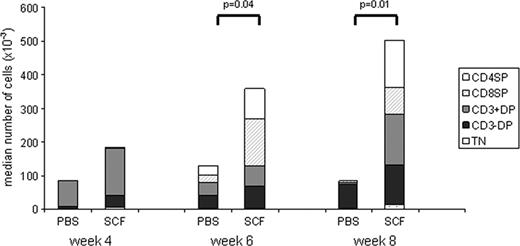Abstract
Abstract 3725
Deficient thymopoiesis, due to epithelial injury by chemo- and/or radiotherapy, age-associated thymic involution and by graft-versus-host disease, is an important determinant of the impaired immune competence following allogeneic transplantation. Therefore, strategies to improve thymopoiesis are considered pivotal to improve T cell recovery and immune competence after transplantation. As SCF is a cytokine produced by thymic stroma and its receptor, c-kit, is expressed by the earliest thymocytes, we evaluated whether SCF administration would improve thymic recovery following stem cell transplantation in immuno-deficient mice receiving: (1) a T-cell depleted bone marrow (BM) graft of congenic mice, or (2) a CD34+CD38low-selected xenogenic hematopoietic stem cell (HSC) graft of human fetal liver origin (HIS) mice model). In the mouse-mouse model, 10–12 week old rag-1−/− mice were 3 Gy irradiated (137Cs -source) and received 2×105 T-cell depleted C57Bl/6 (CD45.1) congeneic bone marrow cells intravenously. Recipient mice received either PBS or recombinat rat SCF (Amgen, USA, 100μg/kg per injection) by subcutaneous injection 3 times a week from day 1 until the end of the experiment. In this model, SCF enhanced thymopoiesis and peripheral T-cell recovery. BM lymphoid progenitor recovery was not affected. Median thymic cellularity increased from 0.9 in PBS- to 266 × 104/thymus in SCF-treated mice (p=0.05), which increase was similarly distributed over the thymocyte subsets of double negative (DN), double positive (DP), and CD4+, CD8+ single positive thymocytes. Next, we assessed whether SCF-induced improved thymic recovery also translated into improved T-cell recovery in the periphery. Absolute numbers of donor-derived newly developed CD4+ and CD8+ T-cells were quantified in peripheral blood, spleen and lymph nodes at weeks 4 and 6 post-transplantation. T-cell numbers were low at 4 weeks after transplantation and did not differ between PBS or SCF treated animals. However, at 6 weeks T-cell numbers were significantly increased in spleen and lymph nodes of SCF treated animals (p<0.05).
Next, we studied the effect of recombinant human (rh) SCF in our HIS mouse model. In short, newborn (days 3–7) Rag-2−/−gc−/− mice were 3.5 Gy irradiated and transplanted with 5–10 × 104 CD34+CD38low human fetal liver (FL) cells intra-hepatically. CD34+CD38low cells were isolated via a two step procedure. CD34+− FL cells were isolated using a CD34 human progenitor cell-isolation kit and further sorted as CD38low using a FACS Aria (BD biosciences). In HIS mice, PBS or rhSCF (Amgen, USA) 100μg/kg per injection) was administered intraperitoneally (i.p.) 3 times weekly as of day 14 following transplantation.
Similar to the murine BMT model, a higher thymic cellularity was observed in SCF treated mice (Fig. 1) in the HIS model. DN and early DP thymocyte subsets were enhanced, albeit not significantly. In contrast, lateDP, CD4SP and CD8SP thymocyte subset recovery was significantly enhanced in thymi of SCF-treated HIS mice. As the HIS model remains a hybrid human–mouse system with limited cytokine cross reactivity and in which MHC-HLA mismatch compromises peripheral T-cell survival (Legrand et al J IMMUNOL 2009), the model did not allow us to study the effect of SCF on T-cells in the peripheral lymphoid organs.
SCF improves thymic recovery following human SCT in an HIS mouse model. Newborn rag-2−/− γc−/− mice were 3.5 Gy irradiated and received 5–10 × 104 CD34+CD38low human fetal liver cells intra-hepatically and were treated with PBS or SCF. At indicated times post transplantation, thymi were harvested analyzed for the human thymocyte subsets: TN (CD3-CD4-CD8-), early DP (CD3- CD4+CD8+), late DP (CD3+CD4+CD8+), CD4SP and CD8SP (CD3+CD4-CD8+).
SCF improves thymic recovery following human SCT in an HIS mouse model. Newborn rag-2−/− γc−/− mice were 3.5 Gy irradiated and received 5–10 × 104 CD34+CD38low human fetal liver cells intra-hepatically and were treated with PBS or SCF. At indicated times post transplantation, thymi were harvested analyzed for the human thymocyte subsets: TN (CD3-CD4-CD8-), early DP (CD3- CD4+CD8+), late DP (CD3+CD4+CD8+), CD4SP and CD8SP (CD3+CD4-CD8+).
Collectively, these results show that SCF may significantly improve post-transplant thymopoiesis after both experimental murine BMT and human fetal liver HSC transplantation in HIS mice. While peripheral T-cell recovery was significantly enhanced in the murine BMT model, it remains to be established whether improved human thymopoiesis will also translate into better peripheral T-cell recovery and enhanced immune competence towards opportunistic infections as well as a better recovery of regulatory T cells. These studies now set the stage for studying SCF, either alone or combined with other thymopoietic cytokines, in a larger pre-clinical animal model.
No relevant conflicts of interest to declare.
Author notes
Asterisk with author names denotes non-ASH members.


